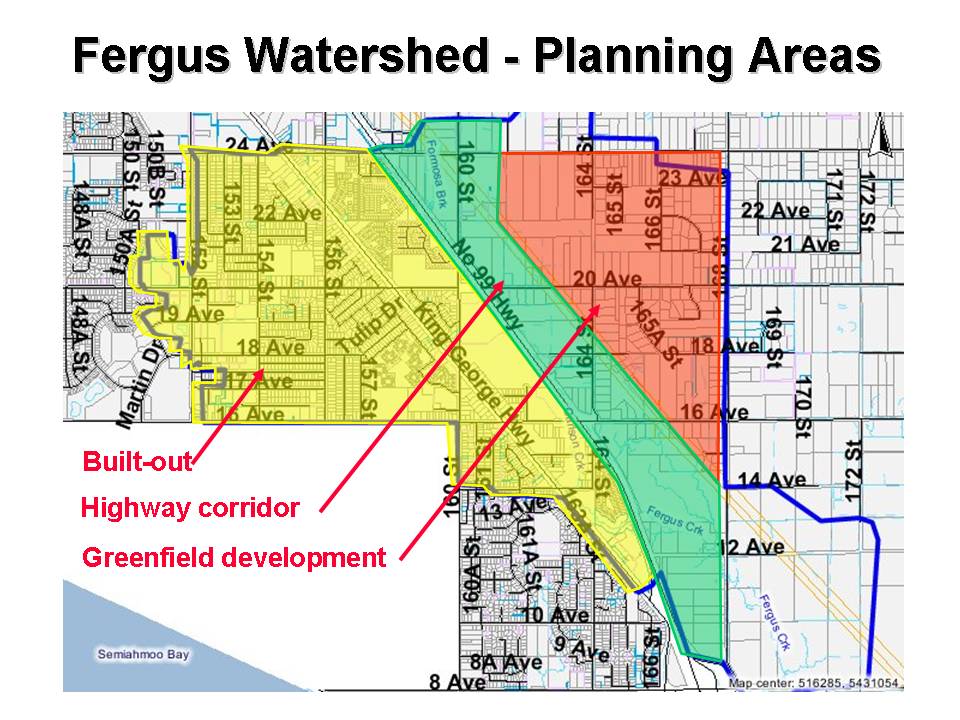Capture Rain Where It Falls: Surrey’s David Hislop informed the 2007 Water Balance Forum that the Fergus Creek Watershed Plan is the pilot for “Beyond the Guidebook”
Note to Reader:
In March 2007, the Inter-Governmental Partnership held a Water Balance Model Partners Forum in March 2007 so that Partners could share success stories and lessons learned in implementing green infrastructure.
Hosted by the Greater Vancouver Regional District, the Partners Forum also provided a timely opportunity to roll out ‘Beyond the Guidebook’, a runoff-based approach to drainage modeling that connects the dots between source control evaluation and stream health assessment.

Fergus Creek Pilot Watershed Plan
“The pilot for Beyond the Guidebook is the Fergus Creek watershed plan that the City of Surrey has recently completed. The Fergus Creek plan demonstrates how to protect stream health in the urban environment”, noted David Hislop, City of Surrey representative on the Water Balance Model steering committee.
 “Experience gained in East Clayton and South Newton was applied in Fergus Creek. The Beyond the Guidebook methodology was formalized as the Stream Health Methodology, and subsequently incorporated in the Water Balance Model when it was integrated with the QUALHYMO engine. The Stream Health Methodology is a function of flow duration, and hence stream erosion,” noted Jim Dumont.
“Experience gained in East Clayton and South Newton was applied in Fergus Creek. The Beyond the Guidebook methodology was formalized as the Stream Health Methodology, and subsequently incorporated in the Water Balance Model when it was integrated with the QUALHYMO engine. The Stream Health Methodology is a function of flow duration, and hence stream erosion,” noted Jim Dumont.
Green vs Blue Solutions
I n commenting on the significance of the Fergus Creek plan as the pilot for Beyond the Guidebook, Kim Stephens observed that the plan is based entirely on implementing ‘green solutions’ as an alternative to conventional engineered ‘blue solutions’, and predicted that Fergus Creek will soon be attracting considerable attention from around North America because of the City’s fundamental shift in approach to rainwater management.
n commenting on the significance of the Fergus Creek plan as the pilot for Beyond the Guidebook, Kim Stephens observed that the plan is based entirely on implementing ‘green solutions’ as an alternative to conventional engineered ‘blue solutions’, and predicted that Fergus Creek will soon be attracting considerable attention from around North America because of the City’s fundamental shift in approach to rainwater management.
 “That’s right”, continued David Hislop, “In addition to rainwater capture on individual lots, the strategy for replicating natural infiltration processes includes creation of contiguous large-scale green corridors through the watershed. Besides obvious environmental benefits the City has concluded that the corridors can result in cost savings for developers (and ultimately homebuyers) and the City because their effectiveness at controlling rainfall volumes makes the traditional detention pond redundant.”
“That’s right”, continued David Hislop, “In addition to rainwater capture on individual lots, the strategy for replicating natural infiltration processes includes creation of contiguous large-scale green corridors through the watershed. Besides obvious environmental benefits the City has concluded that the corridors can result in cost savings for developers (and ultimately homebuyers) and the City because their effectiveness at controlling rainfall volumes makes the traditional detention pond redundant.”
To learn more about the Fergus Creek plan, click on Showcasing Innovation in the City of Surrey.
About the DFO Urban Stormwater Guidelines
Kim Stephens also informed the Partners Forum that: “The Department of Fisheries and Oceans (DFO) is a partner in the Beyond the Guidebook process, in part because this runoff-based approach is intended to resolve performance concerns that we believe have arisen due to misapplication of the so-called DFO Guidelines.”
His reference was to a 4-page document originally released by DFO in 2000 and titled Urban Stormwater Guidelines and Best Management Practices for Protection of Fish and Fish Habitat. This frame-of-reference provided the segue for a detailed presentation by Jim Dumont on the Beyond the Guidebook methodology.
To Learn More:
To read the complete and comprehensive story about the 2007 Forum, click on Inter-Governmental Partnership Rolls Out ‘Beyond the Guidebook’ at Water Balance Model Forum
To read the companion article about the presentation by Jim Dumont, click on FLASHBACK TO 2007: At Water Balance Model Partners Forum, Jim Dumont explained why and how the Runoff-Based Approach connects the dots between on-site rainwater capture and downstream stream health
In addition, click on FLASHBACK TO 2007: City of Surrey provided core content for launch of “Beyond the Guidebook Initiative”
And to learn about the Fergus Creek contribution to the evolution of the Water Balance Methodology, click on FLASHBACK: City of Surrey Innovation Resulted in Evolution of Performance Target Approach to Rainfall Capture



